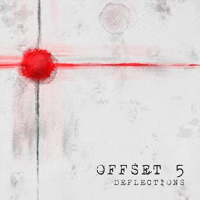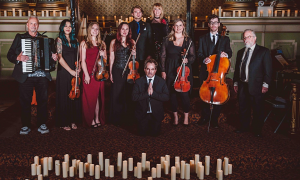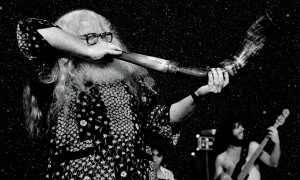Home » Jazz Articles » From the Inside Out » Italian Spirits, Dubé Debuts and Chasing (Mahogany) Frogs
Italian Spirits, Dubé Debuts and Chasing (Mahogany) Frogs

Courtesy Chris Christodoulou
 Paul Colombo
Paul ColomboRio Crystal
Vectordisc Records
2020
Rio Crystal is the perfect title for this bright and clear, warm and sunny set led by guitarist Paul Colombo. Its frontline pairs Colombo's nimble guitar with keyboardist Ron Thomas, supported by bassist Andy Alonso and drummer Chris Loser, in a series of jazzy instrumental workouts. It's uncomplicated swing, and the emotional directness and honesty with which the principals play, turn Rio Crystal from jazz fusion into genuine (instrumental) soul music.
The title track was the first tune recorded and sits like a crown atop this set. Colombo nurtures and nuzzles his electric strings through sinewy blues and jazz lines, pulling out from the rich fullness of acoustic strings, and craftily twists the ending of his solo into the beginning of the restated melody. The rhythm section swings the subsequent "This Heart" into an easy shuffle that Thomas' solo steps into like a homerun hitter locked into his baseball swing, connecting solidly with the groove and opening up the classic soul-jazz organ-guitar small combo sound.
"Soul Mates" closes the set with the same type of mellow jazz vibe, which Colombo waltzes like a proper gentleman into a solid, straight-up and straight-ahead Tal Farlow sound.
These two soloists share a long, deep connection. Colombo can still recall the first time he heard Thomas play, when the guitarist was only fifteen and a friend dropped Pat Martino/Live (Muse, 1972), which features Thomas as the keyboard player, on him. Colombo tracked Thomas down and began studying music with him, and they've been colleagues ever since.
Thomas mines his keyboard riff into the propulsive "Motion Potion," the set's only tune that Colombo didn't compose. Bassist Alonso and drummer Loser construct the propulsive yet supportive rhythms, while Colombo plays like a master electrician, running in electric guitar lines that energize their sturdy framework.
The single-take "Lovesick" showcases the leader's singing guitar lines, with Loser's shimmering cymbals and Thomas' cool yet warm keyboard accompaniment heating up the spotlight, then stepping into the background. Columbo's lead guitar absolutely glows as it sings out in a classic Motown sound, the kind you might hear on a vocal ballad by Stevie Wonder or Smokey Robinson & The Miracles. More likely, it's the sound of Philly soul resonating through Rio Crystal.
 Deelee Dube
Deelee DubeTrying Times
Concord Jazz
2020
Five years ago, the annual Sarah Vaughan International Vocal Competition named Deelee Dube its first British winner and (2016) Sassy Award recipient, landing Dubé a spot at the Montreal International Jazz Festival and recording contract for this Concord Records debut.
Trying Times marks a major label debut, but Deelee Dube is no artistic novice. She started violin lessons when she was four and put together her first band when she was fourteen. Her 2016 release Tenderly was produced and arranged by Italian tenor saxophonist Renato D'Aiello and performed with D'Aiello's quartet. In early 2017, they teamed to present Sarah Vaughan Reimagined: Deelee Dubé Sings Sarah Vaughan with the Renato D'Aiello Quartet at Royal Albert Hall. Dubé is also a published poet and her project artwork has been exhibited at Shakespeare's Globe Theatre.
Trying Times begins with its title track, opened by Dubé's strong and soulful unaccompanied voice, which here lands somewhere between Miss Sarah's sassy swing and Anita Baker's gospel of soul. The instrumental accompaniment builds into a classic, inventive jazz sound, with dissonant horns smudging the lyrics about trouble and pianist (arranger and producer) Benito Gonzalez slipping and sliding into a funky blue haze.
Then Dubé and company thoroughly conquer the series of powerful, challenging tunes that form the backbone of this debut. After romping through a sharp and energetic "On a Clear Day," they downshift into the version of "Ugly Beauty (Still We Dream)" which pairs Carmen McRae's lyrics with the only waltz Thelonious Monk ever wrote. Pianist Gonzalez smudges several "wrong notes" to honor Monk's unique style, just like he mines the sound of Horace Silver from the opening title track, and the singer's hushed final verse dishes a delicious blend of naivete and misterioso.
Next, Dubé's voice detonates "500 Miles High," originally written by Chick Corea to feature vocalist Flora Purim in Return to Forever, into liftoff and orbit. It leaps and bounds like quicksilver its hard-driving and twisting melody, making each note ring and shine. "500 Miles High" divebombs into a full-bore roadrunner's take on "Thou Swell," where pianist Gonzalez, bassist Corcoran Holt and drummer Mark Whitfield, Jr. trade flurries of notes and chords like sparring partners, so fast and furious that your ears can barely keep up. "Thou Swell" closes with an explosion of vocalese fireworks, and then downshifts into a tender duet with Russell Malone's guitar on a languid "Lazy Afternoon."
Altogether, Trying Times presents an incredible range of material energetically performed by a singer and band with the chops to back it up. It's a most impressive debut. (Here's hoping that arranger Gonzalez tries to take on a "On a Clear Day You Can See 500 Miles High" medley for Dubé's follow-up.)
 Jonatan Piña Duluc
Jonatan Piña DulucSoundtrack Vol. I -Secuencia
Self-Produced
2021
Multi-instrumentalist Jonatan Piña Duluc seems to rarely stand still—or even move in one single direction— in his Dominican Republic homeland, where he leads an Afro-Dominican jazz quartet and a hard rock band, and solo projects such as Soundtrack Vol. I -Secuencia, his third independent (completely) solo release.
On one hand, Piña Duluc has already proved his talent for composing by, for starters, claiming top honors in the Dominican Republic's most prestigious composition competition (the Premio Nacional de Música) six different times across three different categories (symphonic/choral, chamber music and Latin dance).
On the other hand, this Soundtrack pulls (or pushes) Piña Duluc into a different writing style. As its title suggests, it presents a series of instrumental suites and pieces written for or inspired by storytelling through film and is entirely self-composed, arranged, performed and recorded (although he turned it over to Iván Batista for mixing).
Listening to music composed for scenes you've not seen or heard is always a risky gambit, but Piña Duluc's strong voices on saxophone and guitar often toss liferopes to the lost listener. Guitar opens and establishes the thick mood of "Impressions Suite I," which hums and rattles like an atmospheric U2 tune. The resonant twangy guitar opening "Veneno Pt. II" suggests an Ennio Morricone western theme, although the background and accompaniment seem to howl an electric nightmare instead.
"Dolce Vita Suite" opens with this same blue guitar sound, electric blue notes strung together to gradually build into a blues shuffle. Piña Duluc doubles guitar back on top of this shuffle to duet with the violin, tumble down and then crawl back up his shuffling hook, and then dissipate "Suite" into a hazy blue soundcloud.
The three-movement title suite consumes eighteen minutes, and the powerful rhythmic engine upon which it run sounds primed to run perpetually. "Iniciación" awakens in a mist of tuned drums and blues guitar harmonics and chords but quickly twists into a knotty progressive hard rock sound, and ends with guitar, saxophone and drums (unsuccessfully) trying to settle an orchestral argument.
"Fiesta del Veneno" builds from churning bass and drums into a happy little saxophone melody that clears out all the other instruments and sets a new stage for spiritualized lead guitar and harmonizing horns, all locked down by percolating percussion, and building up the genuine feeling of communal jazz joy. As "Confirmación" closes this Secuencia suite, the drum and saxophone parts begin ricocheting off each other, accelerating the rhythm and winding the melody tighter, igniting one more guitar solo that explodes like sonic dynamite.
 Italian Spirit
Italian SpiritIn Japan
ITI Records
2021
Italian Spirit began in 2014 as a duo featuring pianist Alessandro Collina and trumpeter Marco Vezzoso, instructor at the National Conservatory of Nice. Their name refers to their repertoire: classic, traditional and contemporary songs designed to revive and inspire emotions in Italians far from home. Collina and Vezzoso have performed extensively from west to east; Live in Osaka was recorded and released by a Japanese label from their first tour of Japan in 2015, and in 2019 they represented Italy at the first (Canton) European Jazz Festival in China.
Italian Spirit virtually returned to Japan with percussionist Andrea Marchesini in March 2021, through a live stream performance of beautiful Italian songs interpreted by their infant instrumental trio. In Japan captures ten of these songs. Their beauty is genuine, subtle yet strong, subtly whispered softly but landing in your ear like a shout.
"The Winter Sea (Il Mare D'Inverno)" opens with crashing waves of piano and percussion which slowly ripple and then recede for the trumpet. Those piano ripples gradually grow into a cascade of waterfalling melody, powering trumpet verses that glimmer and glow with the Chuck Mangione type of warm and bright sound that can make your heart, mind and soul "feel so good." "Diamond (Diamante)" brilliantly illuminates the telepathic empathy between these three musicians; listen, for example, as the percussion pops up in just the right place for the pianist, as the piano notes rise and fall in the same breath as the trumpet, and as that trumpet's beautifully lyrical sound washes like flowing water over its accompaniment.
Pianist Collina plays elsewhere with a brightness and lightness that suggests Vince Guaraldi, including and especially the cheerful and friendly sound of Guaraldi's music for Peanuts. He opens "Under The Fish Sign (Sotto Il Segno Dei Pesci)" with a melody that gorgeously reflects its title—it floats, it dives, it swims, it moves with liquid grace, so gentle and graceful and yet so purposeful.
"I Like 'O Blues (A Me Me Piace 'O Blues)" stuffs a ton of musical fun into less than four minutes (and some funk, too). The arrangement somehow transforms three instruments into the full sound of an orchestra, with an occasional messy, smeared sound on Vezzoso's trumpet that calls up the sounds of Bubber Miley or Cootie Williams messing with the blues in the Count Basie band.
As Italian Spirit serenades "Caruso," Vezzoso, Collina and Marchesini play with profound, resonant emotion, a perfectly beautiful ending to a perfectly beautiful recording captured In Japan.
 Mahogany Frog
Mahogany FrogIn the Electric Universe
MoonJune Records
2021
Have you ever tried to catch a frog?
Frogs are impossibly quick. They jump around unpredictably in starts and stops and in every possible direction. By the time you catch up to a frog, that frog is generally somewhere else already. Frogs are very difficult to catch.
Listening to In the Electric Universe is kind of like trying to catch Mahogany Frog. The seventh studio album (and their third for MoonJune Records) from this Canadian electro-psychedelic instrumental quartet jumps from sound to sound and style to style like their wriggling namesake, with daring compositions and arrangements that hit your ears with the solid crack of a wooden bat.
The fourteen-minute, opening tour-de-force "Theme From P.D." immediately proves the instrumental power and prowess that Graham Epp, Jesse Warkentin, Scott Ellenberger and Andy Rudolph communally share, as it patches several themes together in an overarching post-hip-hop, pre-apocalyptic Pink Floyd framework. A tiny percussion heartbeat slowly emerges from the electric mist, but pulls the music into a head-on smashup with a bass drumbeat that explodes with absolutely monstrous echo.
Then everything just stops. You hear what sounds like someone ejecting, turning over and reinserting a tape. The drumbeat builds back up underneath church organ that swells in and out of jamming keyboards, and then the sound shifts into spacecraft mode, lifts off, and fades away. It is a most cinematic and far-ranging "Theme."
"(((Sundog)))" trots along for more than seventeen minutes. It first blossoms into the spacey (and still) futuristic progressive jazz-rock, keyboard-heavy sound of bands such as Soft Machine. But like "Theme From P.D.," it transitions through a mid-song passage into completely different music; in this case, a howling psychedelic blizzard recedes into a more gentle, allegorical folk tale suggesting Dune or Hobbit mythology that keeps repeating to build up its scope and power. " (((Sundog)))" also ends with a visually evocative sound—the sound of a snore rumbling through a dog's furry chest while it snoozes in the warm, golden sun.
Progressive rock is often burdened with several stereotypes but In the Electric Universe hits deep and hard, and is hardly the sound of proggers noodling while they wait for the smoke and their heads to clear.
 Offset 5
Offset 5Deflections
TRJ Records
2021
Curiously, Italy's Offset 5 began as a trio and took more than a decade to become a quintet. Offset 5 began in 2010, when guitarist Marcello Abate formed an alliance with drummer Federico Negri and contrabassist Federico Negri in a trio devoted to tradition and standards. Offset 5 grew into a quartet with the 2016 addition of alto saxophonist Manuel Caliumi, which simultaneously occasioned the group's move away from standards and into their own, original compositions. (Caliumi and Negri respectively contribute saxophone and drums to the spoken jazz word project NoteSpeak, also based in Italy). Offset 5 became a genuine quintet when vibraphonist Giovanni Perin climbed onboard in 2018.
It's difficult to imagine previous iterations of the Offset 5 sound because Perin's melodic vibes run through Deflections like the Nile River flows throughout and nourishes Egypt.
Vibes provide the crisp alto sax with accompaniment and embellishment in the opening "Totoro," then pour out a solo that rains down delightful watercolor sounds, which Negri's cymbals playfully splash back. Vibes and percussion build up funky percolation to open "Alpaca," and as the alto sings the melody the vibes and electric guitar align and twine their voices into its melody. Perin's midsong solo shimmers with casual elegance, funky yet clean and classic.
"Zaratan" and "Ennio's Song" introduce different moods and sounds. Abate's strummed accompaniment paints the saxophone melody of "Ennio's Song," and vibe and sax solos, in beautiful shades of blue and gold, before stepping quick and sharp into his own bright spotlight. More acoustic strumming introduces "Zaratan," singing a sad little melody that the saxophone picks up and groans like a harmonica blowing some blues. "Zaratan" seems to float, completely suspended in its blissfully tranquil sound, with bass and drums mixed so quietly that they seem to whisper the rhythm behind Abate's romantic acoustic guitar solo.
Deflections also includes a free-flowing, inventive update on the classic "Summertime," one more textbook demonstration that Offset 5 is a jazz collective who can together make music that sounds much greater than the sum of its parts.
 Marcos Resende & Index
Marcos Resende & IndexFar Out Recordings
2021
This debut, eponymous recording by Brazilian keyboard wizard Marcos Resende was recorded in Rio de Janeiro in late summer 1976. This was a truly glorious time for progressive instrumental music in Brazil, as you can hear in the discographies of Eumir Deodato, Marcos Valle, Airto Moreira and many other artists.
Resende put together a new quartet, equally adept in jazz and Brazilian rhythms, for these sessions: Rhythm aces Rubão Sabino (bass) and Claudio Caribé (drums), plus legendary reedman Oberdan Magalhães, who was also organizing in Rio the legendary samba-funk Banda Black Rio at this time. Resende also recruited session engineer Toninho Barbosa, whose recordings with Azymuth (Light as a Feather), João Donato (Quem É Quem) and others earned him the title, "the Brazilian Rudy Van Gelder." Even so, Marcos Resende & Index remained unreleased and unheard until this 2021 remastered issue.
With the opening "My Heart," Resende immediately drops you into a liquid, luxurious pond where you bob and float on soft percussion, bass as quick and nimble as a cat, rippling electric keyboards and waves of other exotic sounds. Resende's keyboard solo explores jazz without breaking its deep connection to the Brazilian rhythm, propelled by the percussion percolating underneath.
Marcos Resende & Index builds from this opener into an eight-minute piece ("Praça da Alegria"), then a nine-("Nergal") and then ten-minute piece ("Martina"). This masterful sequencing creates a feeling of a genuine musical journey, and of arrival at your destination.
First, Resende blasts off from the crackling bass and percussion opening "Praça da Alegria" into an electrifying keyboard solo that freely wheels and deals the galvanizing sound of classic 1970s Brazilian jazz records from Chick Corea, George Duke, and other keyboardists. The rhythm section slows the pace just enough for Magalhães' saxophone to spread sweetness and light like honey on top.
"Nergal" opens like an expansive, wide-open prairie which the leader fills with colorful space-age yet soulful electric jazz sounds spanning from Soft Machine to Sergio Mendes to Richard Wright (Pink Floyd), and then a blast of horns clears out the arrangement for another keyboard solo that sounds more like electric guitar from the Grover Washington, Jr. soul playbook, the bass and drums click back into their circular rhythm track, and "Nergal" winds down to its stop.
A remarkable arrangement, "Martina" moves through about six different movements in ten minutes. It blossoms into a light but heavily Brazilian groove, with percussion chattering like little woodland creatures hiding in the thicket of the mix, and Resende and Magalhães respectively rip into keyboard and saxophone solos that fracture and splatter notes like Keith Jarrett and Gary Bartz barnstorming in one of Miles Davis' electric quintets. Magalhães' flute dances from section to section like a fluttering bird or butterfly—sounding and feeling Light as a Feather.
Tracks and Personnel
Rio CrystalTracks: Rio Crystal; This Heart; Junior; Lovesick; Motion Potion; Wakin' Up; YBB; Soul Mates.
Personnel: Paul Colombo: guitar; Ron Thomas: keyboards; Andy Alonso: bass; Chris L?ser: drums, percussion.
Trying Times
Tracks: Tryin' Times; Still Trying (featuring Russell Malone); On A Clear Day; Ugly Beauty (Still We Dream) (featuring Russell Malone); 500 Miles High; Thou Swell; Lazy Afternoon (featuring Russell Malone); Joy; Unity; Still We Try.
Personnel: Russell Malone: electro-acoustic guitar; Benito Gonzalez: piano, organ; Corcoran Holt: double bass; Mark Whitfield, Jr.: drums; Eric Wyatts: tenor saxophone; Duane Eubanks: trumpet; Andrae Murchison: trombone.
Soundtrack Vol. I— Secuencia
Tracks: Veneno Pt. II; Culpa las palabras, filosas palabras...; Estalkeo y Persecución en la Duarte (Pacumpilin); Dolce Vita Suite; Veneno Pt. III; Impressions Suite I; Impressions Suite II; Secuencia I, Iniciación; Secuencia II, Fiesta del Veneno; Secuencia III, Confirmación; Navajas; Cuarentena 2020.
Personnel: Jonatan Piña Duluc: composition, instruments, voices, recording; Iván Batista: mixing.
In Japan
Tracks: The Winter Sea (Il Mare D'Inverno); Diamond (Diamante); Universal Judgements (Giudizi Universali); Under The Fish Sign (Sotto Il Segno Dei Pesci); Sally; Dance Dance Dancer (Balla Balla Ballerino); Wonderful Thought (Pensiero Stupendo); For Me It's Important (Per Me E' Importante); I Like 'O Blues (A Me Me Piace 'O Blues); Caruso.
Personnel: Marco Vezzoso: trumpet; Alessandro Collina: piano; Andrea Marchesini: percussion.
In the Electric Universe
Tracks: Theme From P.D.; Cube; (((Sundog))); Psychic Police Force; Floral Flotilla (Sail To Me My Love In Your...); Octavio.
Personnel: Graham Epp: guitar, keyboards, electronics, trumpet; Jesse Warkentin: guitar, keyboards, electronics; Scott Ellenberger: bass, keyboards, electronics, trumpet; Andy Rudolph: drums, keyboards, electronics.
Deflections
Tracks: Totoro; Fall; Zaratan; Alpaca; Ennio's Song; Summertime; Stairs; Dinner Urge.
Personnel: Manuel Caliumi: alto sax; Marcello Abate: guitar; Giovanni Perin: vibraphone; Davide Paulis: contrabass; Federico Negri: drums.
Marcos Resende & Index
Tracks: My Heart; Nina Neném; Praça da Alegria; Nergal; Martina; Behind The Moon.
Personnel: Marcos Resende: keyboards; Rubão Sabino: bass; Claudio Caribé: drums; Oberdan Magalhães: saxophones.
< Previous
Asaf Sirkis, Spherical Agenda, Shawn ...
Next >
New Love
Comments
Tags
From the Inside Out
Chris M. Slawecki
Paul Colombo Group
Paul Colombo
Ron Thomas
Andy Alonso
Chris L?ser
Tal Farlow
Pat Martino
Stevie Wonder
Deelee Dubé
Sarah Vaughan
Renato D'Aiello
Anita Baker
Benito Gonzalez
Carmen McRae
Thelonious Monk
Horace Silver
Chick Corea
Flora Purim
Return To Forever
Corcoran Holt
Mark Whitfield Jr.
Russell Malone
Jonatan Piña Deluc
Jonatan Piña Duluc
U2
Ennio Morricone
Italian Spirit
Alessandro Collina
Marco Vezzoso
Andrea Marchesini
Chuck Mangione
Vince Guaraldi
Bubber Miley
Cootie Williams
Count Basie
Mahogany Frog
Graham Epp
Jesse Warkentin
Scott Ellenberger
Andy Rudolph
Pink Floyd
Soft Machine
Offset 5
Marcello Abate
Federico Negri and contrabassist {{Davide Paulis
Manuel Caliumi
NoteSpeak
Giovanni Perin
Marcos Resende & Index
Marcos Resende
Eumir Deodato
Marcos Valle
Airto Moreira
Rubão Sabino
Claudio Caribé
Oberdan Magalhães
Banda Black Rio
Azymuth
João Donato
rudy van gelder
George Duke
Sergio Mendes
Richard Wright
Grover Washington Jr.
Keith Jarrett
Gary Bartz
Miles Davis
Concerts
For the Love of Jazz
 All About Jazz has been a pillar of jazz since 1995, championing it as an art form and, more importantly, supporting the musicians who create it. Our enduring commitment has made "AAJ" one of the most culturally important websites of its kind, read by hundreds of thousands of fans, musicians and industry figures every month.
All About Jazz has been a pillar of jazz since 1995, championing it as an art form and, more importantly, supporting the musicians who create it. Our enduring commitment has made "AAJ" one of the most culturally important websites of its kind, read by hundreds of thousands of fans, musicians and industry figures every month.























